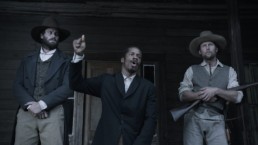Unflinching ‘The Birth of a Nation’ Reclaims Power From History
Sundance’s hottest ticket has arrived, and I managed to attend the World Premiere.
Sundance’s hottest ticket has arrived, and I managed to attend the World Premiere. The true story of slave-turned-preacher Nat Turner and his eventual uprising has been a passion project for actor Nate Parker for 7 years, and he finally quit acting 2 years ago to write, direct, produce, and star in The Birth of a Nation. The amount of love for this man and his work was palpable before the movie even began: it was clear there is something very special here and this was an audience ready for it.
The title is a reclaiming of the same title associated with the 1915 D.W. Griffith silent film. Griffith’s movie was the first epic of its kind but is a blatant and spooky glorification of the Klu Klux Klan from today’s lens. It’s been a blemish that can’t be concealed in cinematic history since its release. Nate Parker’s story repurposes the title as a symbol of how this country was built on the backbones of enslaved Africans and their unavoidable connection to a country founded on the pursuit of freedom. It’s a brilliant way to shelve Griffith’s film, which is an important movie for historical and cinematic study but like the Confederate Flag has no place in today’s world. Parker’s 2016 film most certainly does.
Turner was born a slave but early on was unusually taught to read from the Bible, and would grow up to become a preacher. Through studying the Bible while living in the midst of slavery (which as Parker put it, “allowed nobody to go to sleep without a guilty conscience”), Turner reaches a point where he can no longer stay silent about the cruel injustice that, in this world, is a daily routine. At a certain point, he is tired of the slave owners abusing scripture passages to make their slaves submissive and moves toward radical action as the only path to freedom.
Given the subject matter and time period of history, there is an unavoidable comparison to 2013’s 12 Years A Slave that anyone who has seen both films will feel. 12 Years director Steve McQueen is a masterful visual storyteller and his Best Picture winner is one worthy of all the praise it received. This may mean the impact of Nation is not as visceral, yet there is certainly great value in telling both stories. Interestingly, between the two films combined, 60 years of history are shown, further emphasizing the enormity of America’s slave epidemic. Parker is not as focused on visual thematics as McQueen was, but certainly has a knack for numerous storytelling devices. The music of this film distinctly divides up the scenarios at hand, hopping between three genres that each cue the audience when used. There is some great symbolism that comes into play connecting African history and culture with the slavery, as these slaves were only a few generations removed from their African ancestors. Undoubtedly, the film is in touch with numerous themes related to its religious and historical premise and utilizes them well to tell the story, a part of history that does not have a massive legacy. Compared to the general Sundance lineup, the scale of this film feels like a step above the rest; much of that is due to budget, but a significant amount has to be the intention of the craft.
One area where Parker shines is his depiction of the women in this world. I would advocate for calling this a feminist piece, which will get overlooked given its a movie where race is the forefront of the conversation. A slew of strong women play pivotal roles in the cast: Turner’s grandmother, mother, eventual wife, along with Mistress Turner, the white baroness of the plantation Nat lives on (Aunjanue Ellis, Aja Naomi King, and Penelope Ann Miller). Multiple other women are essential to the story as well. These women play a massive role in his life and are never reduced to bit roles. It’s a rarity for a male director to make so much room for prominent female roles (not to mention especially in a historical film).
Overall, The Birth of a Nation strikes a chord that the industry needs to feel right now and that the audience will experience upon its release. In the wake of #OscarsSoWhite and the lack of media representation, Parker’s unflinching telling of history invites the public to experience a part of this nation’s formation and legacy that may not be well known to the general public, and as Parker emphasizes, reflect on why it matters today.
H. Nelson Tracey
Nelson is a film director and editor from Denver based in Los Angeles. In addition to writing for Cinemacy, he has worked on multiple high profile documentaries and curates the YouTube channel "Hint of Film." You can check out more of his work at his website, hnelsontracey.com

